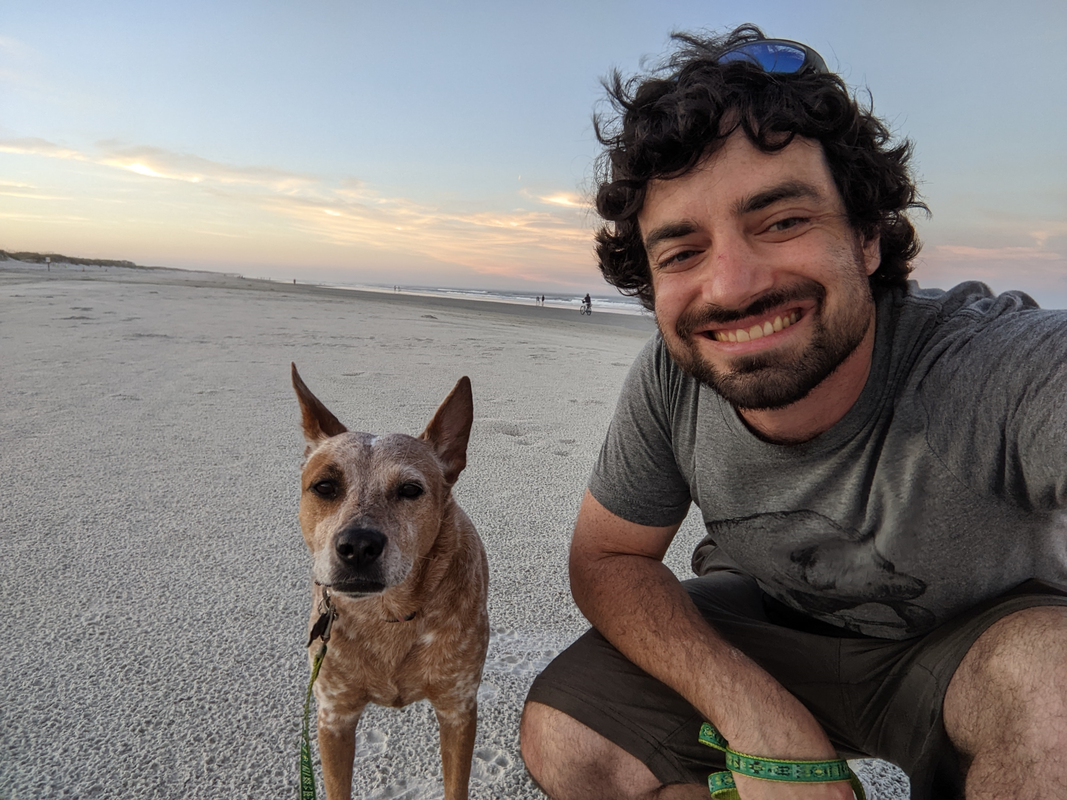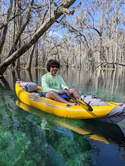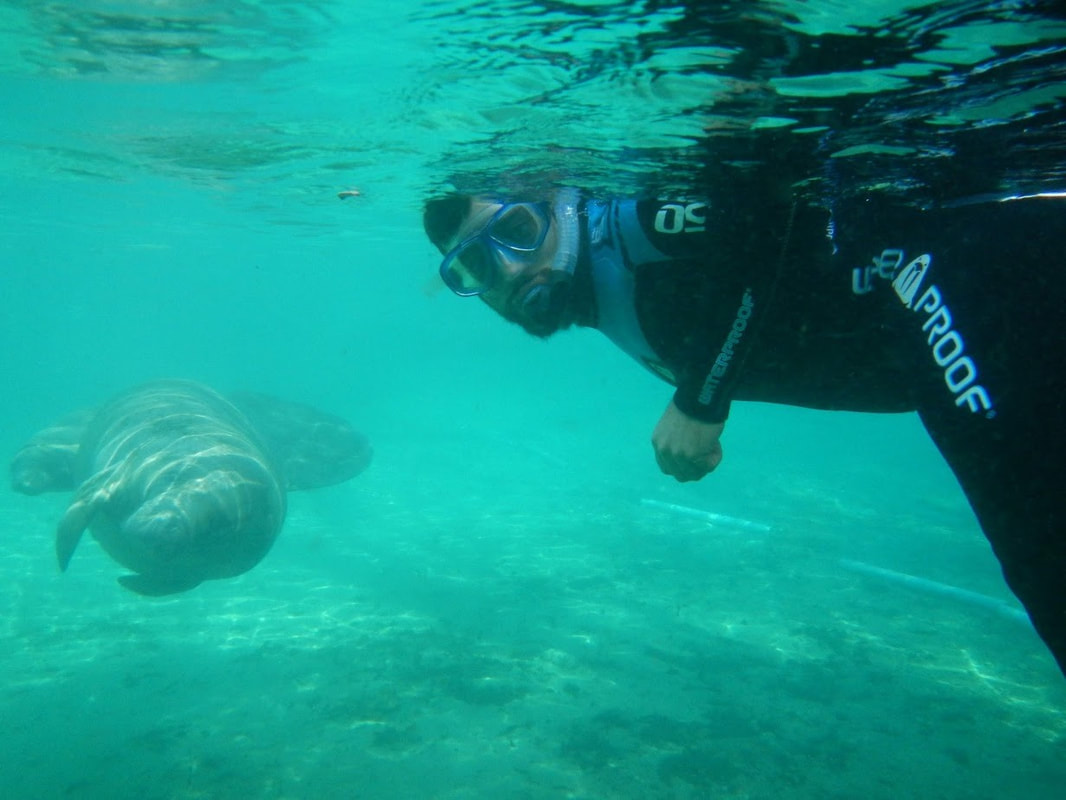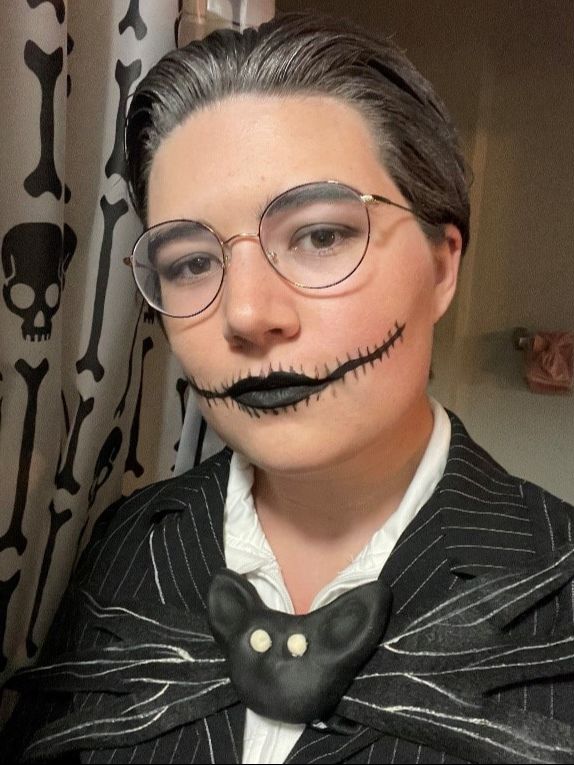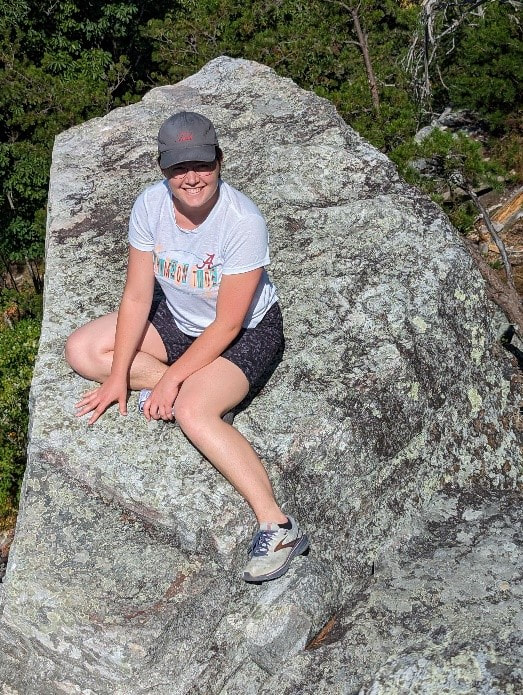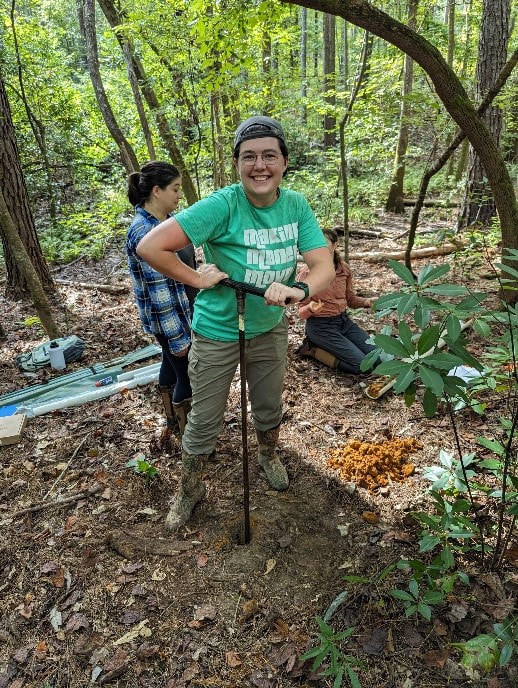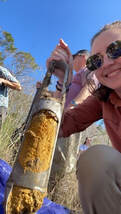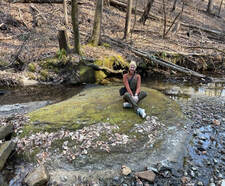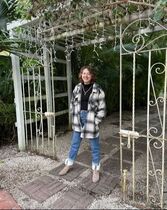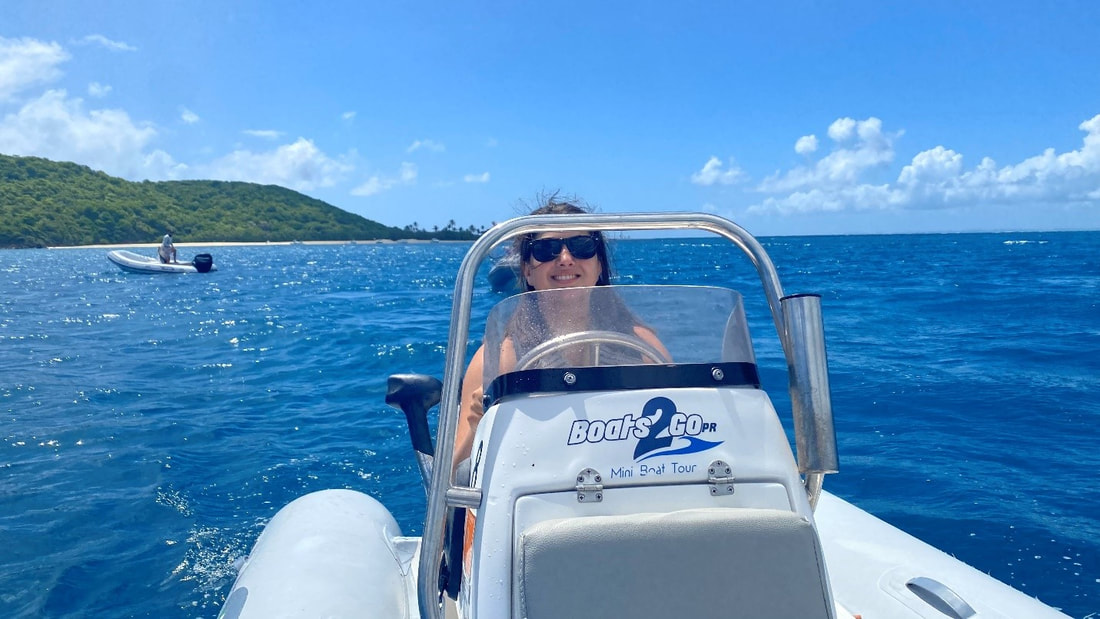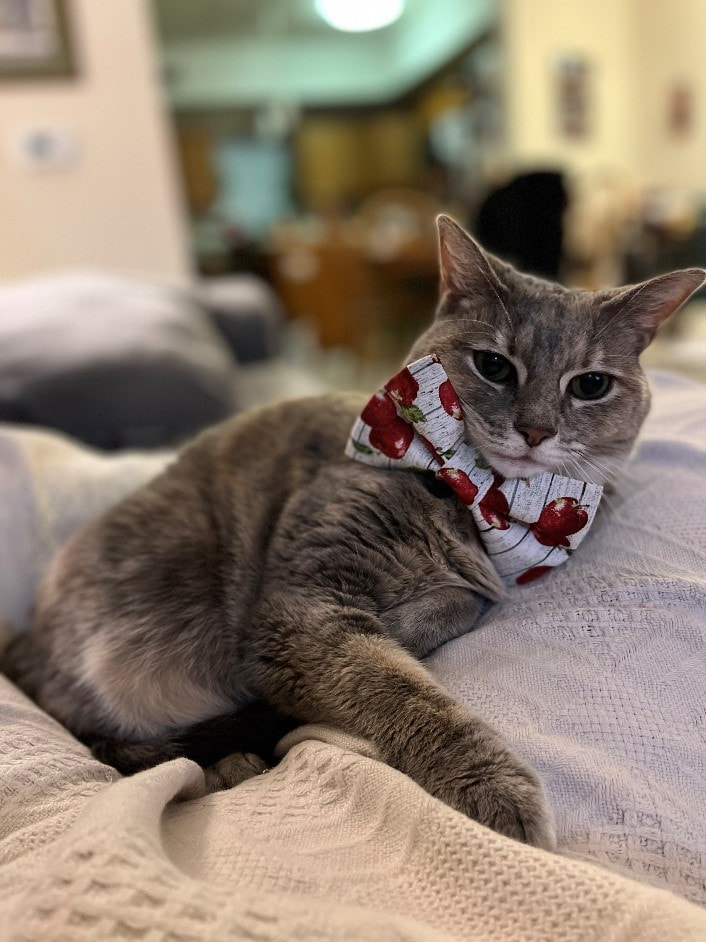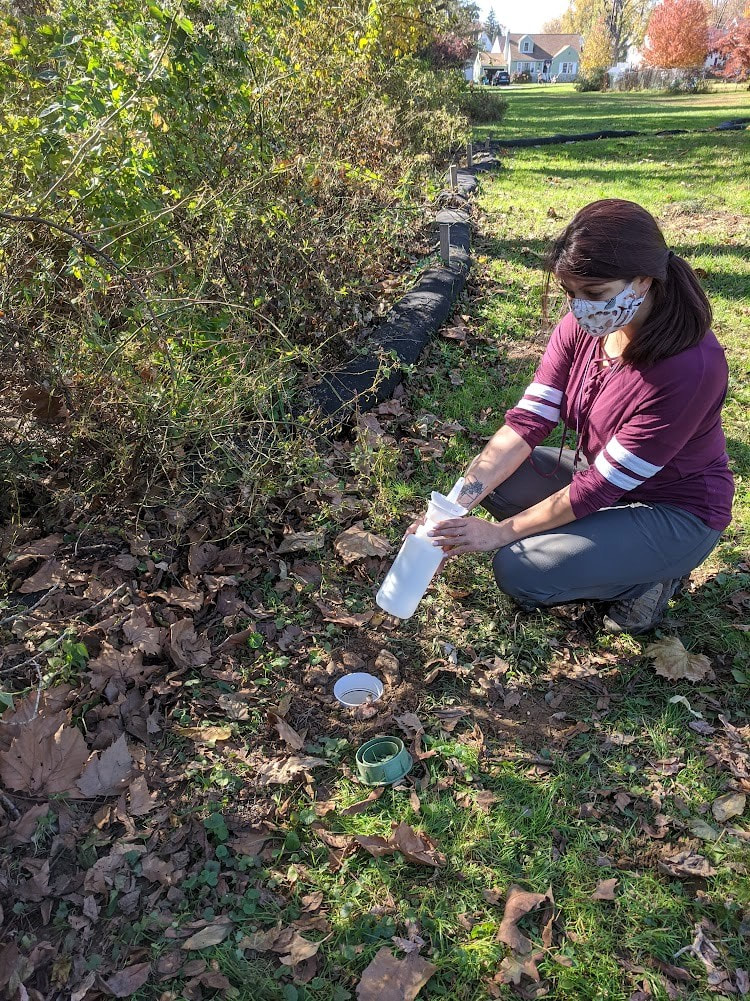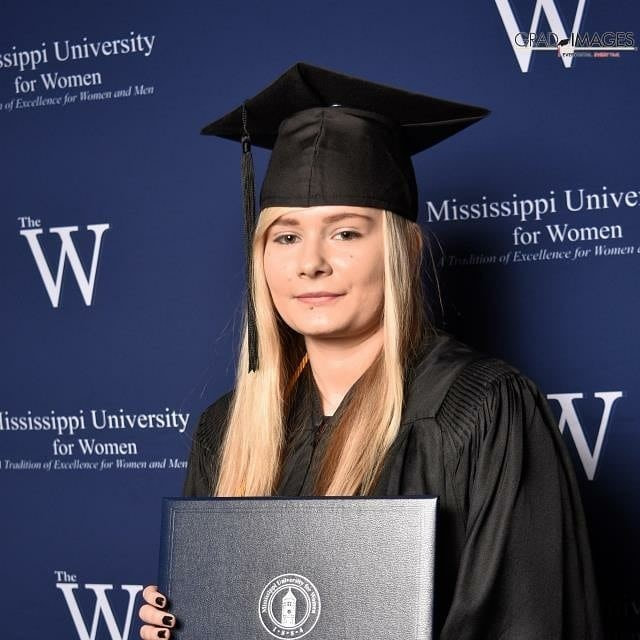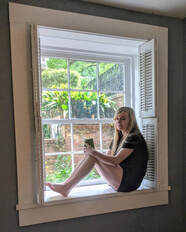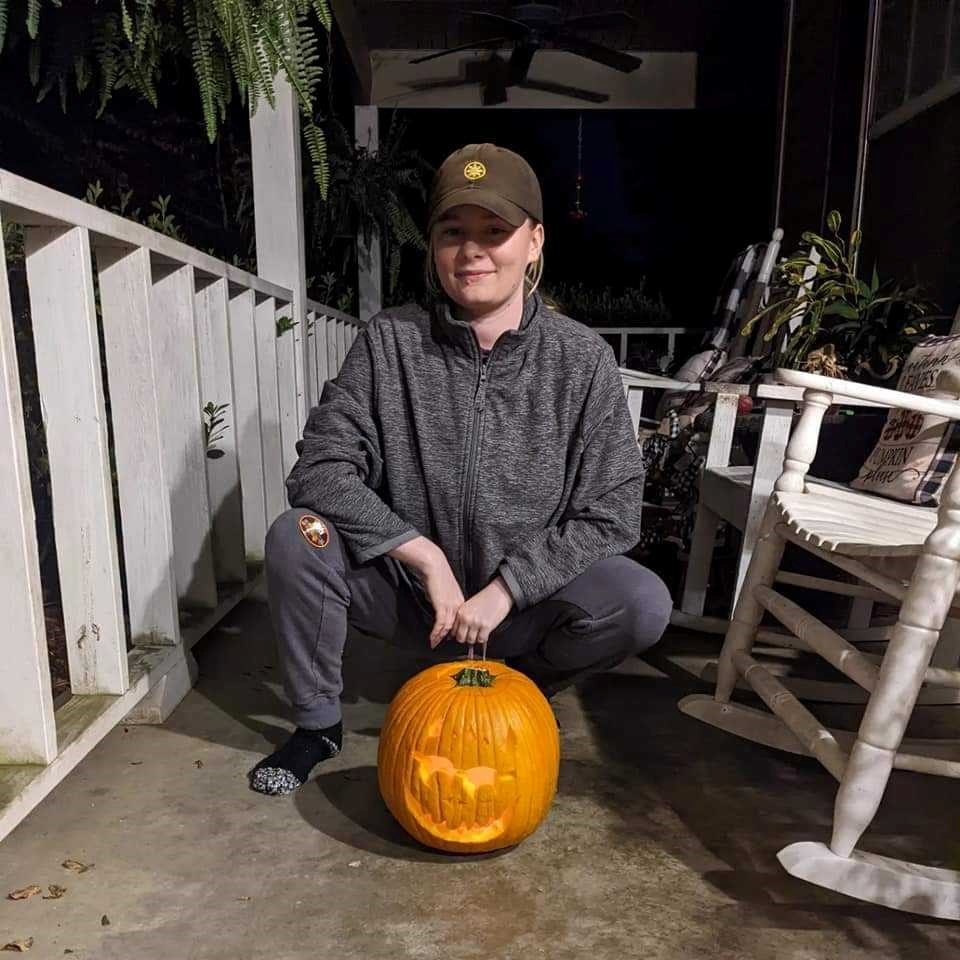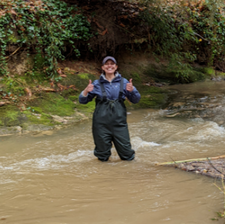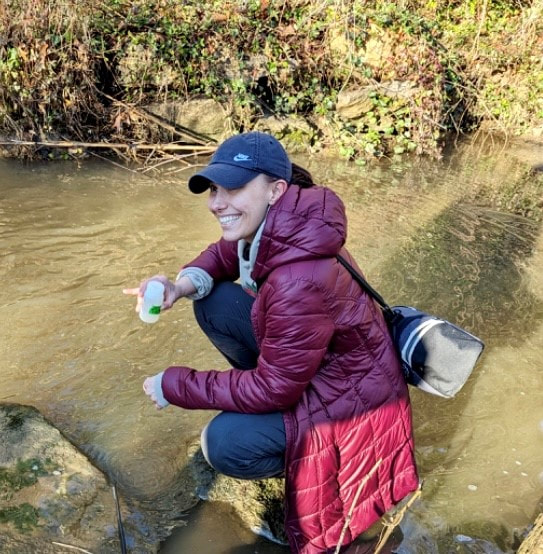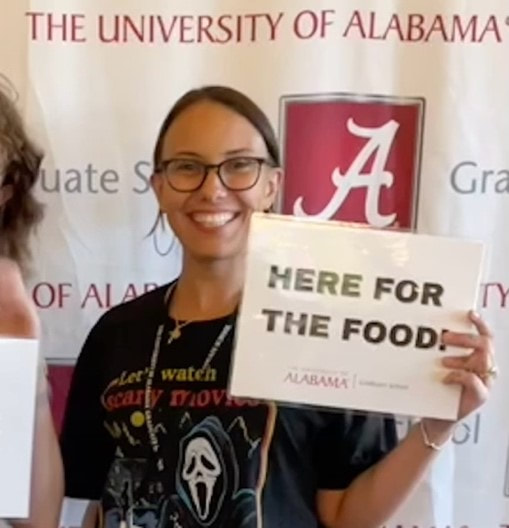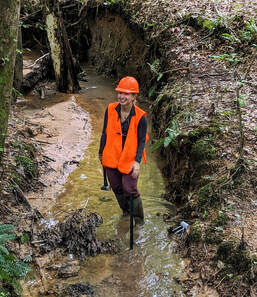New Team Member Spotlight: Adam SidersAdam is an aquatic ecologist broadly interested in resource subsidies, the role of animals in ecosystem function, and food webs. When he's not doing science, Adam enjoys hanging with his dog, fishing, hiking, paddling, and birding.
What research are you currently working on? I am studying the functional role of breakwaters as a tool to prevent salt marsh degradation and how breakwaters and environmental stressors may interact to influence salt marsh structure and function. I am also collecting data for a project studying how salt marshes may be used as a nature-based solution to prevent compound flooding around Mobile Bay. What are you looking forward to most about conducting your research? I am looking forward to working in salt marsh ecosystems. They are very interesting ecosystems at the water-land interface so I’m looking forward to expanding on my understanding of how they function. I am also interested in the possibility of studying ecosystem function along the freshwater to marine continuum. What research have you worked on previously? My dissertation research focused on the effects of manatees on spring-fed ecosystems when they make annual migrations from marine to freshwater ecosystems in winter for thermal refugia. During this research, I was locally known as “the manatee poop guy” and found that manatee feces function as a food source for invertebrates, subsidizing invertebrate secondary production. I have also studied the effects of drought on emergent adult aquatic insects and fluxes of carbon and nitrogen from isotopically enriched leaf species to aquatic invertebrate consumers. Why did you decide to join the Jones lab? I was excited about diving into coastal ecology and learning about salt marsh ecosystems, and the many opportunities involved with the project. When I visited, the good vibes from the folks in the lab and Nate’s down-to-earth nature made me know it was going to be a good decision. I should mention that I am co-advised by Julia Cherry and everything I said applies to her lab too! What are your overall career goals? I hope to continue conducting basic and applied research and to get more involved with teaching, mentoring, and outreach. My goal is to make science accessible to the public and I believe it is my job as a scientist to inform the public about my research and the importance of aquatic ecosystems as a whole. What advice do you have for anyone interested in graduate school and/or a degree in STEM? For those interested in graduate school, I’d strongly recommend finding an advisor who you will get along with well, especially when the times are tough, and not one who is simply well-known in your field. The best way to find out about this is to ask direct questions about the advising style to current and former graduate students of the potential advisor. If the potential advisor has had few or no prior graduate students, you can get an idea of this by asking honest, direct questions about how they see their role as an advisor and what are their expectations of you as a student. It’s best to be direct and intentional about questions to make everything clear and to answer questions posed to you honestly. Graduate school is a big commitment not only for yourself, but also your advisor so it’s best to have a good working relationship since graduate school may last 5+ years and you will eventually rely on your advisor for letters of recommendation. I’d also strongly recommend finding a lab or department in which you will have a good community and be surrounded by like-minded people. This may be secondary to finding a good advisor, but it may also have equal weight especially in large labs where you will be reliant on others to teach you new sampling methods or analytical techniques. For those interested in a degree in STEM, I’d recommend finding as many ways to get involved with hands-on experience as possible and to meet others with similar interests. This may be through joining on-campus clubs such as The Wildlife Society or American Fisheries Society, or through getting involved with a research lab. Try to attend a local or regional scientific meeting to meet others in the field who have jobs similar to one you may like. Do your best to get work experience in your field during the summers. This will be very valuable down the road. Check out websites like the Texas A&M job board. Name 3-5 artists or bands that you’re really into right now. The Killers, Milky Chance, Red Hot Chili Peppers (all bands I’ve seen in the last year!) If you could vacation anywhere, where would it be? Thailand Which 4 famous people (alive or dead) would you invite to a dinner party? David Attenborough, Steve Irwin, Teddy Rosevelt, Robin Williams If you won the lottery right now, what would you do with the money? I’d buy a large tract of land which includes streams and coastal access, set up my own lab, and invest the rest of the money to self-fund my own research program on investment returns! New Team Member Spotlight: Elaine RiceElaine is an undergraduate in the biogeochemistry and ecohydrology labs. She is interested in characterizing flooding events across a wetland gradient.
What research are you currently working on? My current research focuses on using pressure transducers to characterize flooding events across a hydrologic gradient. What are you looking forward to most about conducting your research? I have limited experience with wetlands or hydrology, so I am looking forward to learning as much as possible from the experts on the Floodpulse project. What research have you worked on previously? Prior to joining the Jones lab, I worked in the Mortazavi lab. In that lab I helped Dr. Tatariw on her project looking at how disturbances affect ecosystem function in variably inundated environments. Why did you decide to join the Jones lab? After completing a laboratory technician position under Dr. Mortazavi, I spoke with Dr. Jones about the importance of pursuing my interests in wetland conservation and hydrology. Dr. Jones then gave me the opportunity to work in his lab to further my education in this field. What are your overall career goals? Prior to the summer of 2022 I planned on attending vet school. Then I completed a marine science internship on Dauphin Island and discovered an interest in research. The following semester I joined the Mortazavi lab and then transitioned to the Jones lab. Now I intend to pursue a career in hydrology and wetland conservation. What advice do you have for anyone interested in graduate school and/or a degree in STEM? If you are interested in a degree in STEM do not ignore opportunities that interest you, because you feel like they might not apply to your current career path. Incredible things can happen if you are open to trying new things. What animal would you compare yourself to and why? I would be a cat because I enjoy being up high and taking naps in the sun. If you could vacation anywhere, where would it be? I would really like to go to Iceland. If you were a tree, what kind would you be and why? I would be a magnolia tree because they have really pretty flowers that can start blooming in early spring which is my favorite season. If you had to watch one movie on repeat, what would it be? I would watch Elemental on repeat because it has gorgeous animation. New Team Member Spotlight: Jasmine MorejonJasmine is a MS student in the Jones Ecohydrology lab. She received her B.S. in Environmental Geology from Florida Gulf Coast University and her undergrad research focused on saltwater intrusion in groundwater and its relation to vegetation change on barrier islands. She enjoys reading, hiking, and finding cool rocks.
What research are you currently working on? I am currently working on studying the relationship between wetland connectivity and concentration-discharge relationships and their responses to flood disturbances at the UA Biological Station “Tanglewood”. Through this, I will be installing groundwater wells, analyzing data through RStudio, and learning and utilizing the SCANN Nitrogen sensor. What are you looking forward to most about conducting your research? I’m looking forward to truly understanding hydrologic connectivity between wetlands. I highly enjoy being out in the field, and I am excited to gain more skills such as installing the nitrogen sensor. I am also looking forward to expanding my programming skills through R. What research have you worked on previously? As mentioned previously, my undergrad researched was studying saltwater intrusion in groundwater and its relation to vegetation change on the barrier island Cayo Costa in Southwest Florida. As well as collecting groundwater samples in the field, I gained spatial analysis skills by using ERSI ArcMap. Why did you decide to join the Jones lab? After speaking to Dr. Jones and the lab on zoom and touring campus, my love for science reignited. The environment created in the lab was welcoming, as well as exciting to be able to work with other smart and passionate scientists. The research being conducted in the Jones Ecohydrology Lab is very interesting and adding my own M.S. research will be exciting for the next two years. What are your overall career goals? My main goal is to become a research scientist in academia or a university. After I receive my M.S. at UA, I hope to expand my knowledge and continue in graduate school to receive a Ph.D. in hydrogeology or ecohydrology. I hope to one day lead my own research lab to study sustainability and conservation of water sciences. What advice do you have for anyone interested in graduate school and/or a degree in STEM? Don’t give up! You are smarter than you know, and your passion and drive will get you through STEM. Remember to give yourself self-care and enjoy your hobbies as well. If you don’t already, go touch some grass. If you were a tree, what kind would you be and why? I would be a mango tree. Mangos are my favorite fruit, and you can make smoothies, popsicles, or just eat them by themselves. They grow in tropical environments, and as a Floridian native, I can relate. If you could choose one song that played every time you walked into a room, what would it be and why? Mamma Mia by ABBA, but also the movie version with Meryl Strep. If you had to watch one movie on repeat, what would it be? Everything Everywhere All At Once – “Just be a rock.” Name 3-5 artists or bands that you’re really into right now. Boygenius, Noah Kahan, Hozier, and, of course, Taylor Swift. New Team Member Spotlight: Ashleigh KirkerAshleigh is a postdoctoral scientist using hydrologic modeling and storm sampling to understand connectivity in flooded wetlands and steams. She received her Ph.D. in Geosciences from Temple University where she focused on the spatial variability of runoff pathways in urban catchments. She is especially excited about the integration of field work with distributed surface-subsurface models.
What research are you currently working on? I’m working on a model (with the Advanced Terrestrial Simulator – ATS) of the Shambley Creek watershed in West Alabama to investigate water use in various landscape units under different forest conditions. Plus, we’re gearing up to take flood samples at the Tanglewood Biological Station wetlands. What are you looking forward to most about conducting your research? I’m obsessed with the idea that the origins/connectivity of flow at a subcatchment scale matter to the function of a watershed, and I’m excited to get to mix field work with modeling to try to figure out the how. What research have you worked on previously? For my Ph.D., I worked in urban and suburban watersheds and focused mostly on stormwater runoff. Specifically, I did a lot of overland flow sampling during storms, and I used a model (GSSHA) and nitrate isotopes to better understand where stormwater in our streams and green infrastructure comes from at different points in a storm. Why did you decide to join the Jones lab? First, I got to visit Tanglewood, and I absolutely loved it (you can see the groundwater and surface water mixing!) Second, I was excited to work in a big collaborative group, and the Jones lab hit the right balance of silliness and hydrology-obsession. What are your overall career goals? I want to keep doing research that gets published, so I’m looking for positions in universities or the federal government. What advice do you have for anyone interested in graduate school and/or a degree in STEM? Finding a mentor and a team of colleagues who you ‘click’ with and are doing work you get giddy about is so important. I’m the type of person who sometimes overcomplicates things but trusting my gut on where/who I work with has served me well. Name 3-5 artists or bands that you’re really into right now. Dessa, Miley Cyrus, and Ben Folds – but to get writing done I need to listen to Broadway Cast Recordings. If you could vacation anywhere, where would it be? I recently added hiking in the Chilean Patagonia to my bucket list! If you were a tree, what kind would you be and why? I hope I’d be a mangrove, because I love the smell of a salt marsh and with any luck, I’ll thrive despite the rising sea levels. If you had to watch one movie on repeat, what would it be? What We Do in the Shadows – thank goodness for slightly goth mockumentaries, New Team Member Spotlight: Shelbie KellumShelbie is a PhD student in the Jones Ecohydrology lab. She obtained her bachelor’s in biology from the Mississippi University for Women and is currently working on her master’s in geography at the University of Southern Mississippi. Her thesis work concerns identifying potential pond habitat sites for the critically endangered dusky gopher frog. She likes reading, writing, and pointing out invasive species during hikes.
What research are you currently working on? Since I’m finishing my master’s degree at the University of Southern Mississippi, I’m currently working on two lines of research. My research at USM focuses on identifying potential pond breeding sites for the critically endangered dusky gopher frog using ArcGIS, drone imaging, and field observations. On the University of Alabama side of things, I’m looking at changes in plant species and elevation over time at Grand Bay, Mississippi. I’m hoping to do this through soil coring, previous imagery, and remote sensing techniques. What are you looking forward to most about conducting your research? I’m looking forward to connecting with the community surrounding Grand Bay and working with locals as I conduct my research. Anthropogenic climate change and the sea level rise associated with it not only threatens the region in an ecological sense, but in a social sense. Because of this, one of my main goals in conducting my research is to get involved with public outreach programs in the Grand Bay area. What research have you worked on previously? As I mentioned, I’ve been conducting research concerning identifying potential breeding sites for the critically endangered dusky gopher frog at the University of Southern Mississippi for over a year. However, my initial thesis topic involved dating longleaf pine tree cores and noting the fire scars to construct a fire chronology. The study aimed to compare fire chronologies at two separate sites, one of which was at a montane ecosystem in North Alabama. We wanted to see what impact elevation might have on the fire regime of longleaf pine trees. Unfortunately, my original advisor left before that project could be finished. Why did you decide to do grad school/a postdoc? Why at UA? I knew I wanted to attend graduate school because I was interested in conducting my own research one day. What drove me was the desire to help communities in the Southeast deal with the consequences of anthropogenic climate change. I decided on the University of Alabama for my PhD after talking with Dr. Jones and touring campus. The atmosphere of camaraderie as well as the interesting research being conducted in the Jones Ecohydrology lab convinced me that UA was the place for me. What are your overall career goals? To become a world-famous fantasy author. A professorship and a lab would also be cool. In all seriousness, I would like to stay in the Southeast, continue in academia, and conduct my own research. Since I developed such a connection with the Hattiesburg area, I can see myself returning as a postdoc or in a faculty position. In terms of research topics, I would like to study anything involving controlled fires, coastal restoration, or critically endangered species. What advice do you have for anyone interested in grad school and/or a degree in STEM? Don’t let anyone tell you that you don’t belong. You do. Even if you feel like the odd person out, go forward with confidence. Don’t let your degree become your life. Prioritize your school work and research but make time for yourself and your relationships whenever possible. This is easier said than done, but your mental health matters and that should be recognized by your peers and mentors. If you were a tree, what type of tree would you be and why? I would be a longleaf pine because I gotta represent USM. They also live a long time and are tall. As a 5’3’’ woman, I’d appreciate being tall for once. Name 3-5 artists or bands that you’re really into right now. Zach Bryan, Red Hot Chili Peppers, The Longest Johns, Run the Jewels, Gorillaz. If you had to watch one movie on repeat all day, what would it be? Tombstone. I’m your huckleberry. If you could choose one song that played when you entered a room, what would it be and why? Decent Days and Nights by the Futureheads. This was a song featured in a video game I played as a kid (Burnout 3: Takedown), so it gives me a nostalgic feeling every time I hear it. It’s also quite upbeat and compliments the chaotic nature of graduate school well. New Team Member Spotlight: Alisha GuglielmiAlisha is a PhD student in the Jones Ecohydrology Lab. She received a bachelor’s degree in geological science with a minor in GIS from Salem State University in 2020, and a master’s degree in geoscience with a concentration in water science from Georgia State University in 2023. She is interested in examining the use of hydrologic and remote sensing data to better understand water resources. Her current thesis work involves the development methods to more accurately map and predict private well water contamination in North Carolina. In her free time, she can be found collecting rocks, watching horror movies, and listening to true crime podcasts.
What research are you currently working on? My research at UA utilizes remote sensing and hydrologic data to make spatial predictions about floods, focusing on private drinking water wells. I’m presently in the early stages of developing a methodology to determine whether knowing well location improves the accuracy of contamination prediction from flooding. What are you looking forward to most about conducting your research? I’m excited to collaborate with the engineering folks at Northeastern University and the Department of Health and Human Services people in North Carolina. My background is predominantly in geoscience and hydrology, so I’m eager to learn how our private well research can be evaluated from multiple angles across various disciplines. What research have you worked on previously? I am currently working on improving the analysis procedures I used in my master’s thesis to develop habitat suitability indices for urban beavers in the Southeast U.S. using hydrologic data and remote sensing methods. Once this analysis is complete, my goal is to work with my master’s advisor to progress my thesis toward a publishable article! Why did you decide to join the Jones lab? The Jones Ecohydrology Lab offers the resources I need to develop and execute actionable science, where I can work alongside experts in several subjects. I believe that the future of good science lies collaboration and exchange of information between disciplines, and the Jones Lab (as well as the entire Biology Department at UA) not only allows for but encourages that interdisciplinary collaboration. From a more personal standpoint, the members of our lab group are driven, adaptive, and adept in research and leadership – all qualities I greatly admire. What are your overall career goals? Right now, I’m relatively undecided. I’m leaning towards trying to secure government employment after graduation, or perhaps applying for an AAAS Science and Technology Policy Fellowship. My dream job: I have always wanted to work for NASA, and I would love my career to combine my love for hydrology and remote sensing. What advice do you have for anyone interested in graduate school and/or a degree in STEM? I wish someone told me earlier on that to be a successful graduate student, being “smart” isn’t as important as being resilient. I think elementary, high school, and undergraduate programs teach us to measure our success by the grades we receive, but I found that my success in grad school is more accurately measured by my grace in approaching obstacles and my willingness to problem solve. If you could vacation anywhere, where would it be? My ideal vacation entails relaxing on the beach, so I’d choose the Caribbean island of Antigua. There are 365 public beaches: one for every day of the year! If you were a tree, what kind would you be and why? I would be a weeping willow tree. To me, they perfectly encompass what it means to be bold, unapologetic, and protective, while also demonstrating tremendous flexibility and adaptability. What animal would you compare yourself to and why? I have always said that my spirit animal is a moth, and people are always like, “Why wouldn’t you choose a butterfly?” Like butterflies, moths represent transformation and rebirth through perseverance, and strength through delicacy. Unlike butterflies, though, moths are nocturnal, meaning they’re perpetually seeking light, similar to my optimistic outlook through adversity. If you had to watch one movie on repeat, what would it be? Jurassic Park!
|
|
|
Accessibility | Equal Opportunity | UA Disclaimer | Site Disclaimer | Privacy | Copyright © 2019
The University of Alabama | Tuscaloosa, AL 35487 | (205) 348-6010 Website provided by the Center for Instructional Technology, Office of Information Technology |

